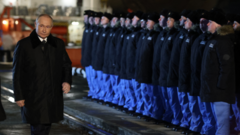**In an address at the Arctic Forum in Murmansk, President Putin acknowledged the growing geopolitical competition in the region while expressing openness to economic collaboration with the United States, reflecting a potential shift in relations.**
**Russia's Arctic Ambitions Amid Changing US Relations**

**Russia's Arctic Ambitions Amid Changing US Relations**
**Putin emphasizes economic cooperation as geopolitical tensions shift in the Arctic.**
In a recent address at the Arctic Forum in Murmansk, President Vladimir Putin underscored Russia's ambitions for leadership in the Arctic amidst an evolving geopolitical landscape, particularly concerning relations with the United States. Drawing attention to heightened competition in the region, he referenced former President Donald Trump's controversial proposal to purchase Greenland, stating decisively, “This is a matter for two specific countries. It has nothing to do with us.”
Putin’s tone was noted for its lack of criticism towards the US leadership, a stark contrast to earlier periods of vocal disputes during Joe Biden's presidency. He acknowledged America's historical motives in relation to Greenland and indicated that the US would persist in pursuing its strategic interests in the Arctic, a reality Moscow appears to accept without animosity.
“We are open to considering different investment opportunities that we can do jointly with the US,” stated Kirill Dmitriev, a senior official in the Russian administration responsible for foreign investment. Dmitriev emphasized the potential for collaboration in sectors such as logistics, contingent upon a resolution to the ongoing conflict in Ukraine. However, he refrained from discussing political dynamics, focusing instead on economic opportunities that could benefit both nations.
Russia’s appeal for investment cooperation comes against the backdrop of its significant natural resources in the Arctic. With shifting narratives in US political discourse, there is an evident recalibration in how Washington discusses its interaction with Moscow. This evolving relationship was reflected in discussions among senior US officials that have, in some instances, aligned with Russian perspectives on contentious issues such as the situation in Ukraine.
In a notable backdrop to these discussions, a giant inflatable whale installation captured public interest in Murmansk, symbolizing Russia’s aspirations for Arctic development. Amidst this setting, citizens expressed varied opinions on cooperation with the US, highlighting a mix of skepticism and hope among the local populace.
Dmitriev also showcased a particular admiration for American entrepreneur Elon Musk, suggesting potential collaboration on ambitious projects like a mission to Mars—leveraging Russia’s advanced nuclear technologies as one avenue for joint efforts.
These developments point towards a potential thaw in US-Russia relations regarding Arctic cooperation, with both nations recognizing mutual benefits in a region that holds vast economic promise, albeit under the cloud of ongoing geopolitical tensions. As the Arctic continues to gain importance, this dialogue may mark the beginning of a new chapter in cross-border collaboration, contingent upon addressing unresolved conflicts.





















